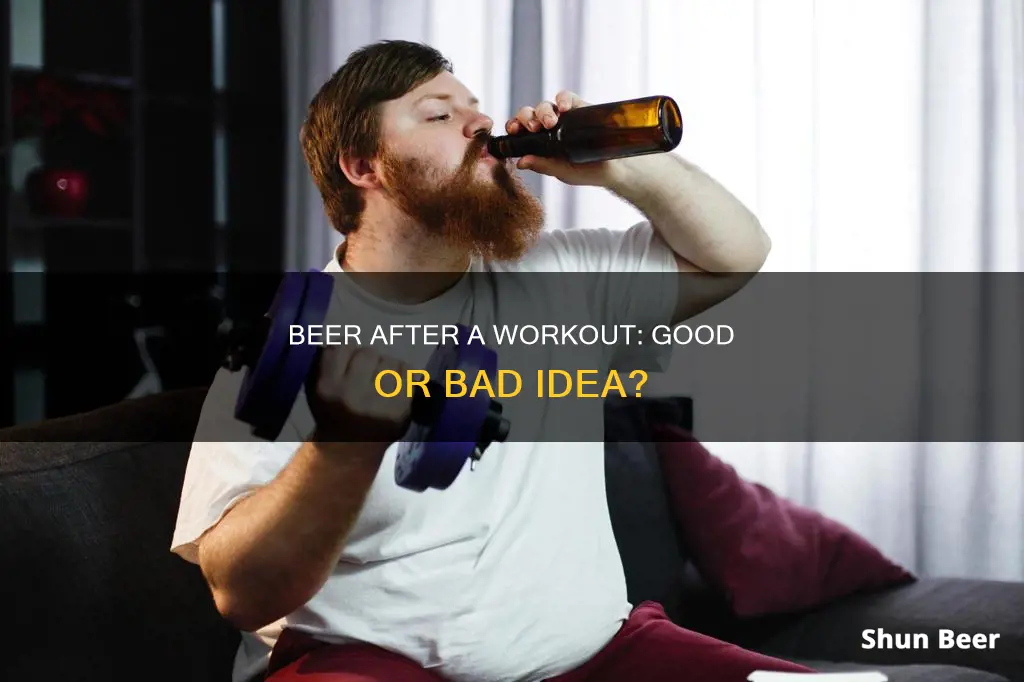
Drinking beer after a workout is a common way to celebrate with friends, but it may not be the best option for your body. Alcohol can affect athletic performance and hinder recovery by impairing muscle recovery, disrupting sleep, and causing dehydration. However, the impact of drinking beer after a workout depends on various factors, including the type and amount of alcohol consumed and the intensity of the exercise. While the occasional beer may not be detrimental, regular alcohol consumption can set back fitness goals due to its effects on hydration, recovery, and performance.
| Characteristics | Values |
|---|---|
| Dehydration | Alcohol is a diuretic, causing increased urination and dehydration. |
| Recovery | Alcohol impairs muscle recovery and growth, leading to increased soreness and reduced muscle mass gains. |
| Sleep | Alcohol negatively impacts sleep quality, reducing the secretion of human growth hormone (HGH) necessary for muscle repair. |
| Nutrition | Alcohol causes nutritional imbalances, leading to potential weight gain and negatively impacting overall health. |
| Cortisol and Testosterone | Alcohol increases cortisol (stress hormone) and decreases testosterone, inhibiting protein synthesis and muscle building. |
| Existing Conditions | Alcohol can worsen pre-existing conditions, such as heart arrhythmias, and interact negatively with medications. |
| Social Aspect | Drinking beer after a workout can be a social activity, enjoyed with friends. |
| Taste | Beer is considered tastier than water, making it a more appealing post-workout beverage for some people. |
| Electrolytes and Carbohydrates | Beer contains electrolytes and carbohydrates, which can aid in rehydration and recovery. |
| Polyphenols | Beer contains polyphenols, providing antioxidant and antiviral benefits that support immune function. |

Dehydration
Drinking beer after a workout can lead to dehydration. Both alcohol and exercise deplete the body of fluids, and the diuretic effect of alcohol increases the urge to urinate, causing further fluid loss. The higher the alcohol content, the greater the risk of dehydration, with alcohol content above 2% increasing the risk.
Rehydrating after one alcoholic drink can require drinking twice as much water, and that's not including the amount of water needed to rehydrate after exercise. The more alcohol you drink, the more dehydrated you'll become, which can negatively impact recovery and overall health.
However, a study found that non-alcoholic beer, low-alcoholic beer, and water resulted in similar fluid retention percentages, although none of the beverages tested were sufficient to achieve full rehydration. Another study found that a low ABV beer, one less than 4%, can be effective as a post-workout hydrator.
To minimise the dehydrating effects of beer after a workout, choose a drink with lower alcohol content, and be sure to drink plenty of water.
Beer Drinking and Weight Gain: What's the Link?
You may want to see also

Poor muscle recovery
Drinking beer after a workout can have several negative impacts on your body, one of which is poor muscle recovery.
Exercise causes tiny tears in your muscles that need to be repaired with protein (called muscle protein synthesis). Alcohol can interfere with this protein production, leaving your muscles sore and damaged. This results in poor recovery, increased soreness, and decreased lean muscle mass gain.
Alcohol also decreases testosterone and growth hormone levels. Testosterone is crucial for building muscle bulk and strength. Meanwhile, growth hormones are necessary for muscle repair and growth.
Drinking alcohol after a workout can also lead to dehydration, which can hinder muscle recovery. Alcohol is a diuretic, which means it makes your body produce more urine, causing dehydration if you don't drink enough water. The more alcohol you drink, the more dehydrated you'll become, which can have serious consequences on your recovery and overall health.
Prednisone and Beer: Is It Safe to Mix?
You may want to see also

Disrupted sleep
Drinking alcohol can negatively impact your sleep, even if it makes you feel sleepy at first. Alcohol can disrupt your sleep by interfering with your sleep cycle and reducing the time you spend in the REM stage of sleep, which is important for feeling refreshed the next day. This can lead to frequent wakings and low-quality sleep.
Drinking alcohol can also affect the production of melatonin and cortisol, which are important hormones for regulating your sleep-wake cycle. Additionally, alcohol can worsen pre-existing conditions such as sleep apnoea, a condition that narrows your airways and can stop you from breathing properly at night.
The negative impact of alcohol on sleep is more pronounced when consumed in larger quantities and closer to bedtime. Experts recommend avoiding alcohol at least 3 hours before bed to minimise its disruptive effects on sleep.
How Alcohol Disrupts Sleep
Sleep Architecture
The typical sleep cycle consists of three non-rapid eye movement (NREM) stages and ends with rapid eye movement (REM) sleep. During sleep, the body cycles through these stages approximately every 90 to 120 minutes. Each stage serves a specific function and is necessary for overall sleep quality and vital processes like learning and memory consolidation.
When alcohol is present in the system during sleep, the sleep architecture is altered. There is an increase in N3 sleep or "deep sleep" and a decrease in REM sleep in the initial stages of sleep. Later in the night, once the body has metabolised the alcohol, there is a rise in N1 sleep, the lightest stage of sleep, leading to frequent wakings and fragmented sleep.
Circadian Rhythm Disruptions
Alcohol can interfere with the body's circadian rhythms, which are biological patterns that operate on a 24-hour cycle. It can decrease the body's sensitivity to cues like daylight and darkness, which are important triggers for shifts in body temperature and the secretion of melatonin, the sleep hormone. Disruptions in circadian rhythms can result in feeling alert when you want to sleep and sleepy when you want to be awake.
Sleep Disorders
Long-term alcohol use can lead to chronic sleep problems and disorders such as insomnia and sleep apnea. Alcohol can worsen snoring and sleep apnea by relaxing the throat and nose muscles, increasing airway resistance, and causing physiological changes that affect breathing during sleep.
Drinking Beer Fast: Why You Won't Get Drunk
You may want to see also

Nutritional imbalances
Drinking beer after a workout can lead to nutritional imbalances. Alcohol is often used as a recovery tool as it is believed to provide carbs and electrolytes. However, beer offers zero nutritional value to the regular exerciser. While beer does contain electrolytes and carbs, they do not benefit the body post-workout.
Beer contains the electrolyte potassium, which is not typically lost during exercise. Instead, sodium chloride, the main electrolyte lost through sweat, is what the body needs to replace. Beer also contains carbs, but they come at a steep price. The body has to use a lot of nutrients, especially B vitamins, to metabolize the alcohol, which puts extra strain on the liver and diverts resources from the rest of the body. These nutrients would be better used in repairing muscles and supporting glycogen production.
Alcohol also inhibits lean muscle gains as it decreases testosterone and growth hormone levels. These hormones are usually increased after a strength workout. Alcohol can also suppress the production of protein needed to repair muscle damage after exercise.
Beer and Tamiflu: Is It Safe to Mix?
You may want to see also

Weight gain
Alcohol is a source of "empty calories", which means it provides a lot of energy but little nutritional value. The calories you consume from alcohol are therefore more likely to be turned into fat. If you're exercising to help with weight loss, drinking beer after a workout won't do you any favours. Even a light beer can contain around 100 calories.
Beer is probably the "least bad" option if you're drinking after exercise, as it tends to contain more electrolytes and carbs than spirits or wine, which can aid your body's recovery. However, it's important to note that the more you drink, the more your recovery and overall fitness level may be affected.
If you're serious about fitness and want to make the most of your workouts, it's best to skip the post-workout beer and go for a non-alcoholic beer, a mocktail, or a recovery drink instead.
If you're going to drink beer after a workout, it's recommended to choose something with a lower alcohol content and to be sure to drink plenty of water.
Beer After Gallbladder Removal: What You Need to Know
You may want to see also
Frequently asked questions
Drinking beer after a workout can affect your post-workout recovery. Experts suggest that it is not the best idea to drink beer after a workout. However, an occasional post-workout beer is generally okay for most people.
Drinking beer after a workout can lead to dehydration, inadequate muscle recovery, disrupted sleep, nutritional imbalances, higher cortisol and lower testosterone levels, potential weight gain, and worsened pre-existing conditions.
Some alternatives to drinking beer after a workout include non-alcoholic beer, mocktails, and recovery drinks.
Some downsides of drinking beer after a workout include dehydration, impaired muscle recovery, disrupted sleep, nutritional imbalances, and potential weight gain.







